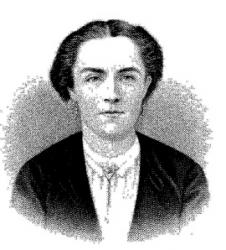- |
User Links
Rebecca S. Pollard › Texts

www.hymntime.com/tch/
| Short Name: | Rebecca S. Pollard |
| Full Name: | Pollard, Rebecca S. (Rebecca Harrington Smith), 1831-1917 |
| Birth Year: | 1831 |
| Death Year: | 1917 |
Pseudonyms: Kate Harrington
Born: September 20, 1831, Allegheny City, Pennsylvania.
Died: May 29, 1917, Ft. Madison, Iowa.
Buried: Farmington, Iowa.
A teacher, writer and poet, Pollard spent her most productive years in Iowa. Her father, Professor N. R. Smith, was a playwright and authority on Shakespeare. She was married to New York poet and editor Oliver I. Taylor. She was the anonymous author of Emma Bartlett, or Prejudice and Fanaticism, a fictional reply to Uncle Tom’s Cabin, intended to expose the hypocrisy of Know-Nothingism.
Pollard’s family moved to Ohio, then Kentucky, where she worked as a teacher. Later, she taught in Chicago, Illinois. Pollard lived in various Iowa cities, including Farmington, Keosauqua, Burlington, Ft. Madison and Keokuk. She began her writing career with the Louisville Journal, whose editor opposed secession and was an important influence in keeping Kentucky in the Union.
In her Letters from a Prairie Cottage, Pollard included a children’s corner with tales about taming and raising animals and of a cat who adopted orphan chicks. Pollard also wrote other children’s books, including a primer and a speller. Pollard’s work in the field of reading represented a pioneer effort to create a sequential reading program of intensive synthetic phonics, complete with a separate teacher’s manual and spelling and reading books, and moving into a broad based graded series of literature readers. Her series is important for its high correlation of spelling and reading instruction, for its concern for the interests of children, for its incorporation of music into the process of learning to read, and as the forerunner for other phonics systems. Her readers were used in every state in America and were used in Keokuk, Iowa, as late as 1937. Few women have single-handedly contributed so much to the field of reading.
In 1869, Pollard published a book of poems titled Maymie, as a tribute to her ten year old daughter who died that year. She followed up the next year with In Memoriam, Maymie, April 6th, 1869, a meditation on death and suffering
Emma Bartlett received mixed reviews when it was published in 1856. The Ohio Statesman gave a very good review, but the Cincinnati Times said, "We have read this book. We pronounce the plot an excellent one and the style charming, but she has failed to fulfill the intended mission of the book." It accused her of also showing prejudice and fanaticism typical of the politicians she tried to defend.
In 1876, she published Centennial, and Other Poems to commemorate the 100th anniversary of the American Declaration of Independence, and the Centennial Exposition in Philadelphia, Pennsylvania, the first official World’s Fair held in the United States. The volume included many poems about Iowa, selected poems of Pollard’s father, and illustrations of the Centennial grounds in Philadelphia.
Pollard was 79 years old when she produced the poem, "Althea" or "Morning Glory", which relates to Iowa.
--www.hymntime.com/tch/
| Texts by Rebecca S. Pollard (6) | As | Authority Languages | Instances |
|---|---|---|---|
| Are you waiting for the coming of the King | Rebecca S. Pollard (Author) | English | 4 |
| Does your signal-light shine? | Rebecca S. Pollard (Author) | English | 3 |
| Herr, ich weih' mich dir nun völlig | Rebecca S. Pollard (Author) | German | 3 |
| Lean hard on Christ | Rebecca S. Pollard (Author) | 2 | |
| Savior 'tis a full surrender | Rebecca S. Pollard (Author) | English | 41 |
| They recked [dreamed] not of danger, those sinners of old | Rebecca Smith Pollard (Author) | English | 3 |


 My Starred Hymns
My Starred Hymns


